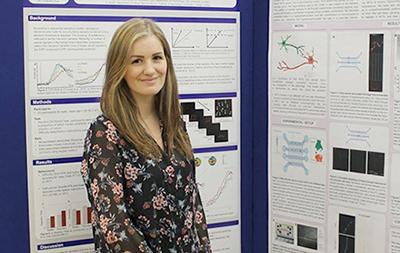Southampton neuroscientist wins three awards for explaining her research into Alzheimer’s disease

Postgraduate researcher Grace Hallinan has been awarded three prizes for presenting and explaining her work into the development of Alzheimer’s disease. Two were awarded at the summer Biological Sciences Postgraduate Symposium, the third at the annual Southampton Neuroscience (SoNG) meeting.
Grace is researching how Alzheimer’s Disease spreads through the brain and progresses by first impairing a sufferer’s memory, then going on to attack other parts of the brain and changing the individual’s personality.
“If we can understand how diseased proteins move to healthy cells, we may be able to find ways of stopping it, but this is painstaking work carried out at the nanoscale, one cell at a time,” she says. “My research also has an engineering perspective, as I’m working with staff at the University’s hybrid bio-devices laboratory on microfluidic devices, the specialist ‘lab on a chip’ platforms I use to grow my cells.”
.jpg_SIA_JPG_fit_to_width_INLINE.jpg)
Two of the prizes reflected the PhD researcher’s impressive posters detailing her work; the third was the Symposium’s Excellence with Impact Award, reflecting her outreach and public engagement activities. Grace is an enthusiastic science communicator and enjoys spreading the word about the latest neuroscience research at events such as Science and Engineering Day and helping to inspire young people to consider careers in research.
Grace also took part in the Changing Minds project with Winchester School of Art, which is part of the University of Southampton. It challenged art students to produce innovative designs for garments based on research into cell structures in the brain. Its aim is to address the stigma and misconceptions surrounding mental health.